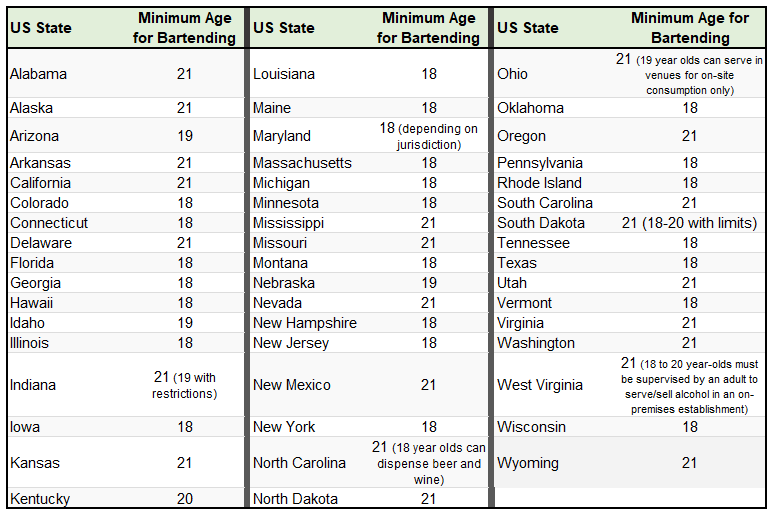So, you’ve been thinking about pursuing a career as a bartender in the USA? Well, you’ve come to the right place. This article aims to provide you with all the steps you need to take to turn your dream into a reality. Whether you’re a student looking for a part-time job or someone considering a leap into the exciting world of mixology, we’ve got you covered. From obtaining the necessary certifications to gaining practical experience behind the bar, follow these steps and you’ll be well on your way to becoming a skilled and successful bartender in the Land of Opportunity. Let’s get started!
Steps to Become a Bartender in the USA
If you have a passion for mixing drinks and creating an enjoyable experience for customers, a career as a bartender in the USA may be the perfect fit for you. Bartending is an exciting and dynamic profession that offers a range of opportunities for growth and creativity. Whether you are just starting out or looking to transition into the bartending industry, this comprehensive guide will provide you with the necessary steps to kickstart your career.

This image is property of servingalcohol.com.
1. Research the Bartending Industry in the USA
Before embarking on your journey to become a bartender, it is crucial to gain a comprehensive understanding of the job market, job requirements, and career opportunities within the industry.
1.1 Learn About the Job Market
Start by researching the current state of the bartending industry in the USA. Familiarize yourself with the demand for bartenders in your desired location and gain insights into the types of establishments that frequently hire bartenders. This will help you better understand the availability of job opportunities and make informed decisions regarding your career path.
1.2 Understand the Job Requirements
Bartending requires a unique set of skills and qualifications. Take the time to explore the job requirements in the USA, as they may vary depending on the state and establishment. Look into the age restrictions for bartenders, as some states require individuals to be at least 21 years old to serve alcohol. Additionally, familiarize yourself with any legal obligations, such as obtaining specific certifications or licenses, that may be necessary to work as a bartender in your area.
1.3 Explore Career Opportunities
While bartending is commonly associated with bars and nightclubs, there are a variety of other career opportunities in the industry. Consider exploring different settings, such as upscale restaurants, hotels, cruise ships, or private events, to find the right fit for your professional goals. This will allow you to tailor your skillset and expertise to the specific demands of your desired career path.
2. Acquire the Necessary Skills and Knowledge
To be successful as a bartender, it is crucial to acquire a range of skills and knowledge that go beyond simply mixing drinks. The following sections will outline the key areas you should focus on during your journey to become a bartender.
2.1 Learn Mixology and Drink Recipes
The foundation of any bartender’s skillset lies in their knowledge of mixology and drink recipes. Familiarize yourself with popular cocktails, spirits, and ingredients, as well as the techniques used to create them. You can start by researching drink recipes online or investing in books dedicated to mixology. Consider practicing making cocktails at home to refine your skills and experiment with different flavors. Additionally, consider taking mixology classes or attending workshops to gain hands-on experience and learn from industry professionals.
2.2 Develop Customer Service Skills
As a bartender, your role extends beyond mixing drinks. Providing exceptional customer service is crucial to building relationships with patrons and ensuring their satisfaction. Work on developing strong interpersonal skills, active listening, and the ability to anticipate and meet customer needs. Practice maintaining a positive and welcoming demeanor even during busy and high-pressure situations. The ability to create a friendly and engaging atmosphere will set you apart and contribute to the overall success of your bartending career.
2.3 Familiarize Yourself with Bartending Tools and Equipment
To excel as a bartender, it is essential to have a comprehensive understanding of the tools and equipment used in the profession. Become familiar with the various types of glassware, bar utensils, and mixing equipment commonly used in bars and restaurants. Practice using these tools, such as shakers, strainers, jiggers, and muddlers, to become comfortable and efficient in their usage. Additionally, learn proper cleaning and maintenance techniques to ensure that your equipment is always in top condition.
2.4 Improve Time Management and Organization Skills
Bartending often requires multitasking and managing multiple orders simultaneously. Improving your time management and organization skills is crucial to keep up with the fast-paced nature of the job. Learn to prioritize tasks, efficiently handle customer requests, and maintain cleanliness and organization behind the bar. Effective time management will not only help you provide prompt service to customers but also contribute to a smooth and efficient workflow.

This image is property of d92mrp7hetgfk.cloudfront.net.
3. Complete Bartending Training
While it is possible to learn bartending skills through self-study and practice, formal bartending training can provide you with a structured and comprehensive education. Consider the following options to enhance your knowledge and gain hands-on experience.
3.1 Enroll in a Bartending School or Program
Bartending schools or programs offer specialized courses that cover a wide range of topics, including mixology, drink recipes, customer service, and bartending techniques. These schools often provide practical training where you can practice your skills in a simulated bar environment. Research and choose a reputable bartending school in your area to ensure you receive quality training from experienced instructors.
3.2 Attend Workshops and Seminars
In addition to formal education, attending workshops and seminars allows you to learn from industry experts and expand your knowledge. Look for local events or online workshops that focus on specific areas of bartending, such as mixology techniques or customer service strategies. Taking advantage of these opportunities will help you stay updated with the latest trends and advancements in the industry.
3.3 Participate in On-The-Job Training
Once you have acquired the foundational knowledge and skills, consider seeking on-the-job training opportunities. Many establishments offer training programs for entry-level bartenders, allowing you to gain practical experience and refine your skills under the guidance of experienced professionals. Take advantage of these opportunities to learn the nuances of working in a real bar setting and familiarize yourself with the specific operations and protocols of your workplace.
4. Obtain Required Certifications
Certain certifications may be required by law or desired by employers to ensure responsible alcohol service and adherence to industry standards. Obtain the following certifications to strengthen your resume and demonstrate your commitment to professional bartending.
4.1 Get TIPS Certification
The Training for Intervention ProcedureS (TIPS) certification is a widely recognized training program that educates bartenders on responsible alcohol service. This certification equips bartenders with the knowledge and skills needed to identify and prevent alcohol-related issues, such as intoxication and underage drinking. Employers often prioritize candidates with TIPS certification, as it demonstrates their commitment to maintaining a safe and responsible drinking environment.
4.2 Obtain Responsible Vendor Certification
Responsible Vendor certification is another important certification to consider. It is required by some states and demonstrates your understanding of the legal regulations and requirements related to selling and serving alcohol. This certification ensures that bartenders are aware of their responsibilities and can properly handle situations related to liquor laws and regulations.
4.3 Consider Other Relevant Certifications
Depending on your career goals and the establishments you aspire to work in, additional certifications may be beneficial. For example, the Wine & Spirit Education Trust (WSET) offers internationally recognized certifications that focus on wine knowledge and tasting skills. Consider pursuing industry-specific certifications to enhance your expertise and marketability within specialized establishments or positions.

This image is property of www.tabconthefly.com.
5. Gain Practical Experience
Practical experience is invaluable in the bartending industry. It allows you to further develop your skills, build a network of professional contacts, and establish a solid foundation for career growth. Consider the following avenues to gain practical experience as a bartender.
5.1 Seek Entry-Level Positions
When starting your bartending career, it is common to begin in entry-level positions to build experience and knowledge. Look for bartending job openings in bars, restaurants, or hotels that are willing to hire individuals with limited experience. These opportunities allow you to learn the ropes, familiarize yourself with the environment, and gain firsthand experience interacting with customers.
5.2 Work as a Barback or Assistant Bartender
If you have difficulty finding an entry-level bartending position, consider working as a barback or assistant bartender. These positions involve supporting the main bartender by restocking supplies, cleaning glasses, and assisting with drink preparation. Although you may not be directly serving customers, these roles provide valuable insight into the behind-the-scenes operations of a bar and allow you to learn from experienced bartenders.
5.3 Volunteer at Events or Charities
Volunteering at events or charities that involve bartending can be a great way to gain hands-on experience while also giving back to the community. Look for opportunities to participate in fundraisers, festivals, or other social events where bartending services are needed. Volunteering not only allows you to sharpen your skills but also provides an opportunity to network with industry professionals and gain exposure to different types of events and venues.
5.4 Participate in Bartending Competitions
Bartending competitions offer a platform to showcase your talent, creativity, and skills while competing against other bartenders. These events often attract industry professionals, including potential employers, and can be a fantastic opportunity to network and gain recognition. Consider participating in local or national competitions that align with your career goals to enhance your visibility within the industry.
6. Networking and Building Connections
Building a strong network of connections within the bartending industry is crucial for career progression and accessing new opportunities. Consider the following strategies to expand your professional network.
6.1 Join Bartending Associations and Groups
Bartending associations and groups provide a platform to connect with other professionals in the industry. Look for local or national associations that cater to bartenders and bartending enthusiasts. Joining these associations not only allows you to network but also provides access to educational resources, job opportunities, and industry events.
6.2 Attend Industry Conferences and Events
Attending industry conferences and events is an excellent way to meet professionals from all facets of the bartending industry. Look for conferences or seminars that focus on mixology, hospitality, or the broader food and beverage industry. These events often feature presentations, workshops, and networking sessions that can help you build meaningful connections and stay updated on the latest trends.
6.3 Connect with Experienced Bartenders and Mentors
Seeking guidance and mentorship from experienced bartenders can greatly benefit your career growth. Reach out to established professionals in the industry and express your interest in learning from their experience. Consider inviting them for a coffee or offering to assist them during their shifts to gain firsthand knowledge from their expertise. Mentorship can provide valuable insights, advice, and support as you progress in your bartending career.

This image is property of sp-ao.shortpixel.ai.
7. Create an Impressive Bartender Resume
Having a well-crafted resume is essential for securing bartending job opportunities. Your resume should showcase your relevant skills, experience, and certifications. Consider the following tips to create an impressive bartender resume.
7.1 Highlight Relevant Skills and Experience
Tailor your resume to highlight the skills and experience that are most relevant to the bartending industry. Emphasize your mixology knowledge, customer service abilities, and experience working in high-pressure environments. Include any related experience, such as serving or hospitality roles, to demonstrate your transferable skills.
7.2 Include Bartending Certifications
List your bartending certifications prominently on your resume to showcase your dedication to professional development and adherence to industry standards. Include any relevant training programs, such as bartending school or mixology workshops, to highlight your commitment to acquiring specialized knowledge.
7.3 Emphasize Customer Service Abilities
Customer service is a fundamental aspect of bartending. Highlight your ability to provide exceptional customer service, manage customer complaints, and create a welcoming atmosphere for guests. Include any accolades or recognition you have received for your customer service skills to further establish your expertise in this area.
8. Search and Apply for Bartending Jobs
Once you have acquired the necessary skills, knowledge, and certifications, it’s time to put yourself out there and start applying for bartending jobs. Consider the following strategies to maximize your chances of securing a bartending position.
8.1 Utilize Online Job Platforms
Online job platforms, such as job boards and professional networking sites, can be essential resources in your job search. Create a professional profile on platforms like LinkedIn and set up job alerts to receive notifications when bartending positions become available. Customize your applications and highlight your relevant skills and experience to stand out from other applicants.
8.2 Contact Local Bars, Restaurants, and Hotels
Don’t be afraid to take a proactive approach by contacting local bars, restaurants, and hotels directly. Reach out to hiring managers or submit your resume in person, demonstrating your enthusiasm and commitment to the establishment. Networking events, mentioned earlier, can be a great way to connect with industry professionals and potentially discover hidden job opportunities.
8.3 Attend Job Fairs and Open Interviews
Job fairs and open interviews provide face-to-face interaction with potential employers and offer an opportunity to make a lasting impression. Dress professionally, bring copies of your resume, and be prepared to discuss your skills and experience confidently. Use these events to showcase your personality, communication skills, and enthusiasm for the bartending profession.

This image is property of aptito.com.
9. Prepare for Bartender Interviews
Once you start receiving interview invitations, it’s important to prepare thoroughly to increase your chances of success. Consider the following steps to excel in bartending interviews.
9.1 Review Common Interview Questions
Research common interview questions for bartending positions and prepare thoughtful answers in advance. Questions may cover topics such as your favorite cocktail recipes, experience handling difficult customers, or your ability to manage a busy bar. Practice answering these questions to ensure your responses are concise, confident, and tailored to each interview.
9.2 Demonstrate Your Knowledge and Skills
During your interviews, be prepared to demonstrate your knowledge and skills through various methods. This may include describing the steps to make specific cocktails, showcasing your ability to multitask and manage customer requests, or discussing your approach to handling customer complaints. The more you can showcase your practical skills, the better impression you will make on potential employers.
9.3 Dress Professionally and Show Confidence
First impressions matter, so dress professionally for your interviews to convey a sense of confidence and professionalism. Regardless of the establishment’s dress code, opting for business attire is always a safe choice. Maintain good eye contact and exhibit a positive and friendly demeanor throughout the interview to showcase your ability to engage with customers effectively.
10. Continuously Improve and Learn
Bartending is an ever-evolving profession, and it’s essential to stay updated with industry trends and continue honing your skills. Consider the following strategies to continuously improve in your bartender role.
10.1 Stay Updated with Industry Trends
Keep up with the latest industry trends and innovations in mixology, new cocktail recipes, and emerging spirits. Follow industry publications, read bartending blogs, and engage with bartending communities on social media to stay informed. This knowledge will enable you to adapt to changing customer preferences and provide an exceptional experience behind the bar.
10.2 Attend Advanced Training and Workshops
To further advance your career, consider attending advanced training programs and workshops. These opportunities can provide specialized knowledge in areas such as advanced mixology techniques, pairing food with cocktails, or managing a bar program. Continuously expanding your skillset will make you a valuable asset to any establishment and open doors to new career opportunities.
10.3 Experiment with New Cocktail Recipes
Continue experimenting with new cocktail recipes and flavors to keep your menu fresh and exciting. Explore different combinations of spirits, syrups, and garnishes to create unique and flavorful drinks. This creativity will not only impress customers but also differentiate you from other bartenders in the industry.
Embarking on a career as a bartender in the USA can be an exciting and rewarding journey. By following these comprehensive steps, acquiring the necessary skills, and continuously improving, you will be well on your way to success in the bartending industry. Prepare yourself for hard work, dedication, and a wealth of opportunities to create memorable experiences for customers and advance your career. Cheers to your exciting future as a bartender!